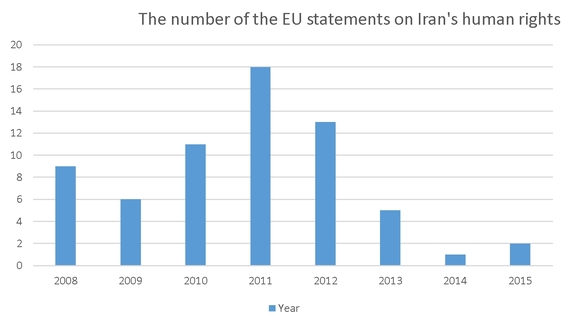Last week, while the EU foreign ministers were getting together to discuss how they can pursue an agreement on trade with Iran, the UN Special Rapporteur on the Situation of Human Rights in Iran announced that almost 1000 people were executed in Iran last year; the highest number of using death penalty per capita in the World.
However, the astonishing number of executions as well as deterioration of the situation of journalists, human rights defenders, political prisoners and Baha'i citizens did not seem to concern the EU diplomats at all. As the Italian Prime Minister, Matteo Renzi, cheered the beginning of the EU's new journey with Iran towards signing billions of Euros-worth of deals in a range of sectors, the EU policy on Iran's human rights shifted dramatically but quietly.
Historically and despite all its ups and downs, for over three decades, the European Union's policy towards the situation of human rights in Iran had been a mixture of condemnation and dialogue or carrots and sticks, which had worked to some extent.
In 2011 and as a result of enormous efforts by the human rights community the EU Council finally adopted certain regulations subjecting the perpetrators of serious human rights violations in Iran to measures such as visa bans and assets freeze. The efforts had followed the mass crackdown on dissidents, journalists, lawyers and writers after the contested presidential election of 2009.
In applying the new regulation, from 2011 to 2013, a total of 87 individuals and one entity were added to the list of human rights sanctions. Nevertheless, this period proved to be no more than an interim period of adopting exceptional temporary public policy.
In 2013 soon after the new Iranian president, Hassan Rouhani, came to power promising nuclear negotiations, the EU seems to have eased the implementation of its adopted policy, reducing the use of effective tools such as public statements and human rights restrictive measures.
The chart below shows how the number of EU public statements on the situation of human rights in Iran have plummeted over the past two years. Whereas in 2011 there were 18 public statements over issues such as death penalty, political prisoners, religious persecution and access to information, this number has been reduced to only one statement in 2014 on death penalty.
One example amongst many is that in 2011, the EU High Representative expressed serious concerns over the wave of arrests of Baha'i citizens. Last month, 24 Baha'i citizens were sentenced to long terms of imprisonment ranging from 5 to 11 years but the EU chose to remain silent on this issue.
The impact of the policy shift on restrictive measures has been even worse. Not only one single name has not been added to the list of human rights sanctions, but also in April 2015, the EU Council removed the names of two individuals without providing any reason or justification.
More outrageously, European ministries of foreign affairs which used to ask NGOs like Justice for Iran to submit proposals to add new names to the list of human rights violators; is now increasingly asking for the name of those who should be delisted. Therefore, it is quite feasible that this year in April, when the EU Council is supposed to revise the human rights sanctions list, many more perpetrators who have been involved in serious human rights abuses, will be delisted. It will be coincident with the planned visit of the EU foreign policy chief Federica Mogherini to Tehran who, unlike her predecessors, has been completely silent on Iran's human rights record.
Before the Iran deal was finalised, the EU argued that it did not wish to jearpodise the chances of reaching a deal by stressing on Iran's human rights record. Now, however, that the deal has been achieved, there is no justification for continuing with this reckless policy of indifferent.
Some have argued that in the post-Iran-deal-era, the EU would prefer to engage Tehran with human rights dialogue rather than adopting aggressive strategies such as public statement or human rights sanctions. Yet, there is not a single piece of evidence to show such engagement.
Official delegations from multiple European countries have been queuing to visit Tehran while, not a single one of these officials has indicated that they even had any talks with Tehran over the human rights issues. They all seem to follow an unwritten but well-understood rule: as long as human rights is not on the table, the Iranian officials will be willing to negotiate or sign off financial deal.
Moreover, historically we have learned from the behavior of the Islamic Republic that human rights dialogue alone does not alter their attitude unless it is substituted with international pressure.
These are all happening while there has not been any meaningful change in the internal policy of Rouhani's government in terms of respecting and promoting internationally recognized rights. All these facts are occurring while the listed and unlisted perpetrators enjoy absolute impunity and continue to commit egregious crimes.
"We ... reassure the people of Iran that they have not been forgotten," said Catherine Ashton, the former EU High Representative. "EU will continue to speak out and to call on the Iranian authorities to respect the rights of their citizens in accordance with the international obligations to which they have committed," she said.
Today, that promise seems to be all but lost. In fact, the EU policy towards Iran's human rights situation has not been transparent, consistent, or honest and it cannot therefore, be regarded as effective.
While the expedition of financial deals is submerging using human rights tools, the trust between the EU and the victims and survivors of violations will become lost unless the EU reaffirms its stand on promoting universal rules of human rights.
Until then, deeply affected by the confusing and contradictory messages sent by the EU on human rights those distressing questions about the integrity of the EU policy on human rights will remain.
